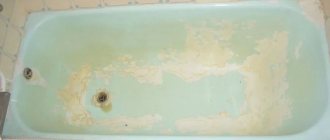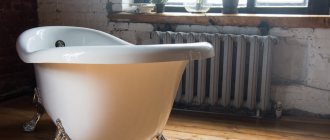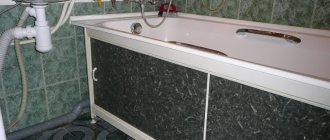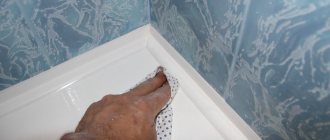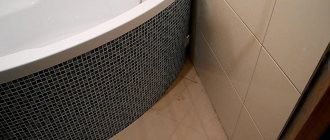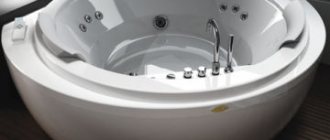The need to replace an old bathtub can come at the most unexpected moment. The family budget does not always provide a reserve amount for this type of repair. As an alternative, an acrylic bathtub insert can be used, the cost of which is much cheaper. And you can do the work yourself. The main thing is to understand the essence of the process and understand all the nuances.
We suggest you figure out how to install a liner in an old bathtub, thereby avoiding a complete replacement of the plumbing. We will tell you what to look for when choosing an acrylic tab, and also provide step-by-step instructions for installing it.
What you need to know about acrylic bathtub cover: main features
Bath covers were invented several decades ago, and today they are widely used both abroad and in Russia. With their help, you can give an old bath a decent look without spending a lot of money.
PHOTO: stroyportal.ru Restoring a bathtub using linings will cost relatively less than buying new plumbing fixtures
In order to restore the inner surface of an old bathtub, it is best to use special devices - acrylic linings. This is a cover that needs to be attached on top. In just a few hours, the product’s appearance and performance characteristics are restored and the bathtub takes on its normal appearance again.
PHOTO: expert-n.info A bathtub after restoration using liners is almost impossible to distinguish from a new one
Determining the dimensions of the insert
So, first, decide on the required dimensions of the acrylic insert. And the dimensions will obviously depend on the dimensions of the bath itself, so it needs to be measured. There are two ways to do this.
Method one. Paid metering
You can contact a company engaged in the production and installation of acrylic liners. Similar organizations exist in every city. A specialist will come to you, take measurements and notify you of all the parameters.
Method two. Self-measuring
If you wish, you can measure the old bathtub yourself; to do this, arm yourself with a tape measure and measure the following parameters:
- internal width (you only need to measure the top of the product under the side; to make the indicator more accurate, measure the bathtub from both sides at once);
- depth (near the drain hole);
- internal length (also measure it from above and in two places);
- outer length (measure in the same way).
Also pay attention to the shape (oval, rectangle). Write down all the information and go buy a new acrylic insert.
Measuring the bathtub to select an acrylic liner
Advantages and disadvantages of acrylic bath liner
Advantages of the method of restoring the surface of the bathtub using linings:
- installing the lining and updating the bathtub takes no more than two hours, repairs and installation are simple, but special equipment is required;
- the ability to correct serious defects such as stagnation of water and improper tilt;
- during the restoration process there is no need to touch walls and other surfaces in the room;
- cost-effectiveness is the main plus. Installing a new bathtub will cost much more than updating an old one;
- the material has low thermal conductivity, due to which the water drawn into the bath cools more slowly;
- the service life of the bathtub is increased to 15 years;
- A coated bathtub removes dirt and plaque much easier;
- the surface of the bathtub is completely restored, even if there were deep cracks on it.
PHOTO: blitz-remont.ru There are several shade options to choose from, you can easily choose an overlay that matches the color
But acrylic inserts also have some disadvantages:
- in order to care for the treated surface, you need to use special products;
- restoring the damaged insert entirely is impossible, so it is replaced;
- The mechanical strength of the linings is not high. Damage can occur if a pet jumps into the bathtub and grabs it with its claws, or a shampoo bottle falls;
- If the installation is carried out incorrectly, the tightness of the liner is usually broken. Because of this, moisture accumulates under the bottom, which after a few months leads to the formation of fungus.
PHOTO: bitu.ru Installation work has high requirements that must be met
Materials used for the manufacture of acrylic inserts for cast iron and steel bathtubs
The technology for producing acrylic inlays assumes that already cut sheets will be laid on a special molding machine. Then the workpiece is heated to a certain temperature, it becomes plastic and is immediately applied to the bath, taking the desired shape.
The final cost of the work depends on what material is used. Most often in the production of inserts they use:
- PMMA (polymethyl methacrylate) . This type of raw material is also called plexiglass; it is thermoplastic. PMMA has a snow-white, smooth surface and is highly resistant to abrasion. The insert does not quickly deteriorate under the influence of chemicals;
- ABS plastic . It is an impact-resistant and thermoplastic material made from resin.
PHOTO: expert-n.info With the correct choice of material for the insert, long-term operation and a guarantee against surface abrasion and damage are ensured
Inlay manufacturing technology
An acrylic insert used to restore the appearance of an old bathtub visually resembles a cover placed on top. It allows you to return lost performance qualities to a sanitary container in a matter of hours.
This restoration option has been used for several decades by Americans, Europeans, and for 2 decades by our fellow citizens. This is an affordable and convenient way to get the desired result without unnecessary dirt.
This technology involves putting a thin liner on a powerful frame from an old bathtub that has lost its visual appeal.
The most important thing about an acrylic liner is its quality. Therefore, when choosing this product for home, you need to pay attention to manufacturers with a good reputation. Otherwise, even a conscientious installation will not save the situation - the insert may burst after a month of use.
The plumbing market offers liners made from the following materials:
- medical acrylic;
- two-layer plastic – ABS/acrylic;
- ordinary plastic;
- technical acrylic.
Regular plastic and technical acrylic are used by unscrupulous manufacturers. They present their products as high-quality products at an affordable price. But such savings will backfire in just the second month.
Plumbing medical acrylic (PMMA) has been replaced by two-layer acrylic for the last couple of years. The fact is that ABS/acrylic material has the best performance qualities. Thus, it is more impact resistant compared to fragile acrylic.
The technological process of manufacturing inserts is complex and requires the skill of a craftsman and the availability of expensive equipment. In artisanal conditions, the production of high-quality products is impossible.
The plant has all the necessary equipment from foreign manufacturers. The material is also foreign and meets hygienic requirements.
To make liners, they take a single-color sheet of cast acrylic with a thickness of 0.6 cm and, under the influence of vacuum and high temperature, give it the desired shape on a machine. For molding, special molds made of aluminum or synthetic composite are used.
Two-layer plastic is essentially a monolithic material that can be molded in the same way as pure acrylic. It is important that the thickness of the acrylic layer is 0.5 cm or higher. Indeed, in products with a 2 mm layer, the operating surface is quickly damaged.
The overwhelming number of foreign manufacturers and all domestic ones use ABS/PMMA material. The upper hygienic layer has dirt-repellent and antimicrobial properties, and the lower one ensures the reliability of the product.
The shape of the old bathtub is important. Not all models can be purchased with an acrylic liner. Large factories have up to 20 different dies for the production of inserts for the most common cast iron and steel products. If during the measurement process it was discovered that the bathtub is non-standard, then you will have to choose an alternative upgrade option.
Factories produce only a certain number of earbud models. After all, the cost of the form itself is quite high, so making it to order for each client is unprofitable
You should not trust private manufacturers who promise to make an insert for a specific model. It will be very expensive and no one can vouch for the quality of the product.
Also, in the case of a non-standard model, you cannot buy a slightly smaller liner. According to the “bath within a bath” restoration technology, it should be like a second skin, worn over the old product.
Performance characteristics of acrylic liners by type
Depending on what material was used to create the insert, you can say with almost 100% accuracy how long it will last and what properties it will have. Before choosing one type of material, you should familiarize yourself with all the main types and their characteristics.
PHOTO: expert-n.info The performance characteristics of the bath depend on the type of insert used
Molded liners
Caring for cast inlays is very simple and not painstaking, since they have a flat and smooth surface. There are small pores that quickly become clogged with dirt if left untreated, so it is recommended to wash the bathtub after almost every use. If contamination does appear, it can be easily removed.
The service life of the product is about 10 years. It is important that during installation all rules are followed and the integrity of the material is not compromised.
Attention! The cost of processing material is no more than 30% of the cost of the entire bath.
It is important to note that some manufacturers supply the market with cheap cast inlays. If funds are limited, they can also be used. But, since acrylic sheets are very thin, damage to the surface can occur very quickly.
Low quality acrylic is also sold at a low price. You can distinguish poor quality acrylic from good one by the presence of a yellowish tint and large pore size. A good insert should be smooth and even.
PHOTO: badentegel.nl
PHOTO: stroy-podskazka.ru
PHOTO: master-2.ru
Composite liners
In the manufacture of this type of liner, two main components are used: acrylic and ABS plastic. The first is applied in a thin layer to a ready-made plastic base. Such a product is practically no different in appearance from a cast one, but costs less.
It is worth paying attention to such inlays if the cost of an inlay made of pure acrylic turns out to be very high. However, such a product does not have high strength. The average service life is 5 years. After this time, even the most high-quality and well-installed product will wear off the acrylic layer.
PHOTO: static1.bigstockphoto.com
PHOTO: stroy-podskazka.ru
Installation highlights
First of all, it must be said that acrylic liners can only be found for standard bathtubs. For everything to work for a long time, the shape must match perfectly, so they are molded according to the sample. In essence, they make the same bathtub, but from polymer. That’s why this technology is also called “bath in bath.”
If you decide to improve the appearance of your bathtub using this technology, you will need to measure it accurately. The proposed dimensions 150x70 or 170x70 don’t say anything, you still need to know the depth.
How to measure a bathtub to purchase an acrylic liner
In addition, the bath should be standard and have thick walls, which gives a small change in size under load. The ideal case is cast iron bathtubs. With their thick walls and large mass, they are the best support for the insert.
You can also install an acrylic liner in a steel bathtub, but only if it bends very slightly. The thing is that when the size changes, acrylic also bends. If the bends are too significant, then after some time the liner will crack. Therefore, if your old bathtub is sagging, give up the idea of installing an acrylic liner; it may be better to restore the coating using self-leveling acrylic. Another option is to make a rigid pedestal (from bricks, for example) under the bathtub, which will prevent it from sagging.
Preparing the bath
Before starting work, the bathtub must be thoroughly cleaned. If it has a trimmed side, the trim must be removed. When finishing, use a tile edge; you don’t have to remove it if the edge is at least 1 cm free. After this, you need to carefully remove traces of silicone, cement, glue - in general, clean the edges down to clean enamel. Next, remove the connected drains.
Next, wash the bath itself. Moreover, it must not only be washed from dirt, but also thoroughly degreased to improve adhesion during installation. Then, wipe it thoroughly with a sponge and baking soda. You need to rub every centimeter thoroughly, including the sides. Afterwards everything is washed off and the bath is dried.
Prepared bath - enamel removed
The second way to prepare your bathtub for liner installation is to remove the enamel. This can be done manually using sandpaper mounted on a block, or using an attachment on an angle grinder (a flap sanding wheel works best). After the enamel is removed, everything must be washed, then also degreased and dried.
Which method is more reliable? Second. But such preparation takes a lot of time and effort. The first method, if done correctly, works no worse.
Preparing the Liner
When preparing the insert for the bathtub, you need to cut its sides to the required size and make holes in the right places. To do this, place the liner in the bathtub, mark all the necessary places and remove it.
Although the liner is light, it is voluminous. It is very convenient to install and remove it. Suction cup handles (for carrying glass) are helpful, or a wide luggage strap running under the bottom can help.
We install the liner, mark the lines along which the sides need to be cut and mark the technological holes
Having pulled out the liner, we cut it along the marked lines. This can be done with a jigsaw or hacksaw. It is advisable to find a special blade for plastic, but you can try a regular one for metal. The main condition is that the edge must be smooth, without burrs. If necessary, the edge can be sanded, but the adjacent surfaces of the bathtub must not be scratched.
You can use a grinder to trim an edge only if you are a master of it and can cut exactly along the intended line. To cut holes you need a screwdriver or drill and bits of the appropriate size. With their help we make holes for drainage and overflow. To secure the edges, stock up with clamps.
Installing the liner
The acrylic insert is installed in the bathtub on two-component polyurethane foam. You cannot use ordinary construction material; it will not give the desired effect. The technological holes for draining and overflowing are coated with a layer of silicone sealant. In this place, tightness is very important, since many problems arise precisely because water penetrates between the liner and the bathtub body. Therefore, we do not skimp on the sealant; we apply it in a thick shaft. It is better to put two rings on it for safety.
An example of applying foam under an acrylic bathtub insert
After this, we use two-component foam to create a grid over the entire surface of the bath. The distance between the foam strips is about 10 cm, smaller at the bottom. The application pattern is arbitrary, but the substance should be distributed evenly. You can use a photo as a basis. The foam must be applied quickly, the polymerization start time is 15 minutes, before this time the liner must be installed in place.
Next, the acrylic insert into the bathtub is installed in place and crimped well. The bottom requires more effort - you need to squeeze it carefully. And also press the liner well around the holes and along the sides. Secure the edges with clamps.
The next stage is installing the drain. The overflow can be left for later, but a drain will need to be installed. In the case of a siphon, figure out in advance whether there are enough threads to install it in a bathroom with an insert.
After the drain is installed, the bath is filled with water almost to the overflow hole and left there until polymerization is completed. The specific period depends on the foam; it can be found on the packaging. Water is poured so that the expanding foam does not bend the liner.
Water prevents foam from bending acrylic
While the foam polymerizes, seal the joint between the insert and the bathtub around the perimeter. To do this, use white or transparent silicone sealant (not acrylic). To prevent the silicone from subsequently darkening or developing fungus or mold, look for formulations with antibacterial components. You can also use aquarium sealant. It is definitely not affected by fungi, it has been verified. After this, you can restore the border around the perimeter of the bathroom.
That's all, the installation of the insert in the bathtub is completed, after the foam has polymerized, it is ready for use.
Manufacturers of acrylic liners for bathtub restoration
When choosing acrylic liners for bathtub restoration, you should pay attention to several large and trusted manufacturers:
- ISComp LLC . In the production of overlays, a unique, industrially developed and patented method is used. All products are high quality and certified. The client can choose a specific size and color.
- Plastall . The company supplies materials for the restoration of both cast iron and steel bathtubs. Several offices have been opened in Russia, in countries far and near abroad. The manufacturer offers liquid acrylic for restoration and ready-made inserts.
- SevenLux . The company's office is located in Togliatti. High-quality German equipment is used in production. The technology is completely original, which is confirmed by relevant certificates.
- "Multiplast" . We supply high quality products that fully comply with all current standards and requirements.
PHOTO: ekonomihatti.com Every high quality product manufactured in official production must have a certificate
The procedure for determining the insert size if you decide to buy an acrylic bathtub liner without installation
If the price of the finished product is high, you can carry out the installation yourself by selecting a tab of a certain size. You should pay attention to the following parameters:
- bathtub length, measured along the outer edge;
- length of the bathtub inside, without sides;
- depth, measured next to the drain;
- width at the head and above the drain.
PHOTO: static.tildacdn.com Measurements must be taken carefully to get the most accurate figure
If you can determine all the parameters, you can purchase the insert without installation.
Acrylic insert or bath replacement: choosing the right option
To give the bath a normal look, you can purchase a new product or use acrylic inserts. The first option is preferable, however, if funds are limited, you can use overlays.
PHOTO: dr-vann.tomsk.ru A finished insert costs less than new plumbing fixtures
If your plans do not include a major bathroom renovation, then inserting a liner may solve the problem temporarily. Installation is done manually, and knowing the exact shade and size of the bathtub, you can choose the most suitable insert.
Advice! In order for the insert to fit and last a long time, you need to choose a product that was produced at the factory.
How to choose an acrylic liner for a bathtub - recommendations from our editors
To ensure that the liner lasts for many years, you should pay attention to several details when choosing:
- liner surface. It is important that it is smooth and silky to the touch, without large pores;
- the material must be white without any tints;
- thickness - the more, the better. Acrylic bends slightly when pressed, but no more than 2-3 millimeters.
Advice! If the product fully meets all the requirements, it is worth checking with the seller about the wall thickness and what material the liner is made of.
Why choose acrylic?
When deciding for yourself whether an old bathtub needs an acrylic liner, you need to pay attention to its significant advantages. Perhaps friends or relatives have already used it and have had a positive experience. It’s good to cooperate with a company that officially represents the manufacturer and has good reviews from real people.
The acrylic insert has an aesthetic appearance. It is endowed with dirt-repellent properties. The polymer itself has no pores in which bacteria can multiply, so the product is safe for bathing children and people with delicate or sensitive skin.
Also, allergy sufferers can safely take a bath - the acrylic insert has a natural snow-white color. No dyes are used in the production process.
The updated bathtub is strong and stable, because the old container, tested over the years, acts as a frame, and the new liner has a safe and beautiful surface
The PMMA material applied on top of the ABS layer is resistant to minor scratches. If damage does occur, it can be repaired using a special acrylic repair kit.
Another advantage is ease of maintenance. A soft sponge and soap solution are enough to clean the surface of the acrylic insert.
But all this applies only to high-quality products that have the appropriate documents from the manufacturer.
Sometimes you may encounter the unfortunate experience of installing an acrylic insert. Here, most often, the owner’s excessive savings are to blame. By choosing a cheap Chinese shell instead of a high-quality liner and hiring a crooked craftsman to install it, you get a beautiful cheap bathtub for 1 week/month. After a short time, the pseudo acrylic liner will burst beyond repair.
How to install an acrylic liner in a bathtub: sequence of steps
When performing installation yourself, you must follow the instructions exactly.
PHOTO: i.vanna46.rf The main condition is compliance with the work technology
Preparing the bath
Sequence of work:
| Illustration | Description of action |
| Thorough cleaning of the bathtub. The side is beaten off and washed. Using a grinder, remove all the trim and clean out dirt. | |
| The surface is degreased. Special compounds are used, which are then washed off. The bath needs to be dried. Install a siphon. Make sure that the connection is completely sealed. |
Preparing the Liner
The insert also needs to be prepared before installation:
- The technological edge to protect the liner is cut off.
- Using special nozzles, adjust the hole for drainage and overflow. It is necessary to accurately measure the space.
- Install a siphon. Make sure that the connection is completely sealed.
Then the installation process begins:
| Illustration | Description of action |
| The entire bottom of the bath is evenly coated with three-component foam. | |
| The tab is installed. Particular attention should be paid to the bottom and sides. It is important to press the box firmly. | |
| Then the excess sealant is immediately removed and the drain grates are secured. The bath is filled with water to check the quality of the installation. | |
| All seams are sealed with a sealant with a high water resistance rating. And the last stage is filling the bath with water. This will help press the pad as tightly as possible to the bottom. |
Video: installing an acrylic liner in the bathroom
Acrylic liner care
In conclusion, let's say a few words about caring for the acrylic liner.
Since acrylic is a non-porous material, you can use almost any product to wash it, for example, the one you use to wash dishes. The only thing is that you should never wash the bathtub with metal sponges or brushes, since they are quite likely to leave marks on the acrylic.
Also, to avoid scratches, it is not recommended to bathe large pets in an acrylic bathtub without a special mat.
But if damage does appear, you can get rid of it using liquid acrylic, which you can easily find in any modern construction supermarket.
With the help of liquid acrylic and a special polishing mixture, chips and cracks in an acrylic bathtub can be eliminated without a trace
Installing an acrylic liner (video)
As you can see, installing an acrylic liner is not particularly difficult. The main thing is to use only high-quality materials and strictly follow installation recommendations. And in this case, we are sure that your old bathtub will really get a “new life” and will serve you for many years to come. Good luck with your renovation!
Sergey Kolosov
Born in 1977 in Donetsk, Ukraine. Graduated from the Donetsk Polytechnic Institute (now Donetsk State Technical University) with a degree in Automated Control Systems. Worked at the Donetsk Metallurgical Plant. In 1997 he moved to Moscow, where for 8 years he worked in several construction teams. Upon returning to Donetsk, he opened his own small enterprise for the production of metal-plastic windows. Today, due to the political and economic situation in the region, unfortunately, production had to be curtailed. But, as they say, “every cloud has a silver lining.” But now I can share my experience with the readers of this site. I hope you find it useful. Why can I be considered an “expert” in the field of renovation? Well, firstly, I graduated from one of the best specialized universities in the country and in some matters I am a certified specialist. And, secondly, and this is the main thing, while working at the Moscow “shabashki” I had to do almost all types of repair work - from bricklaying to artistic wall painting. And almost always there were real masters of one thing or another next to me, so there was someone to learn from. Of course, I did not become a “super master” in all areas of repair. But, nevertheless, all my advice is based mostly on personal experience. Although, of course, it cannot do without the support of the “omniscient” Google and Yandex. But from them I select for you only the latest and best facts, carefully process them, separate out all the nonsense and fluff, and only after that present them to you. Considering that the last phrase is very reminiscent of a ketchup advertisement, I will finish my “literary attempts”. I’d better start writing a new article, which, I really hope, will help you solve one of the many problems that arise in the process of improving your home. Good luck with your renovation!
Restoration of bathtubs with liquid acrylic: advantages and disadvantages of the method
For standard bathtubs, restoration is not difficult; you just need to use a ready-made insert of a suitable color. However, if the design is non-standard, the liner must be made to order, which greatly increases the cost.
An alternative option is liquid acrylic. Its characteristics are much higher than those of epoxy paint. When carrying out work, acrylic is poured onto the surface and carefully distributed on the surface.
PHOTO: plastol.ukr Liquid acrylic can be used to treat a bathtub of any shape

